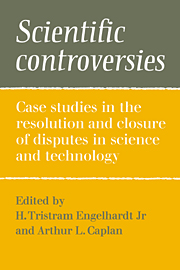 Scientific Controversies
Scientific Controversies Book contents
- Frontmatter
- Contents
- Preface
- List of contributors
- Introduction: Patterns of controversy and closure: the interplay of knowledge, values, and political forces
- PART I THEORETICAL PERSPECTIVES
- PART II CONTEMPORARY CASE STUDIES
- PART III CONTROVERSY, CLOSURE, AND THE PUBLIC
- 26 The role of the mass media in scientific controversy
- 27 The National Commission on Human Experimentation: procedures and outcomes
- 28 The forms and norms of closure
- Author index
- Subject index
26 - The role of the mass media in scientific controversy
Published online by Cambridge University Press: 03 February 2010
- Frontmatter
- Contents
- Preface
- List of contributors
- Introduction: Patterns of controversy and closure: the interplay of knowledge, values, and political forces
- PART I THEORETICAL PERSPECTIVES
- PART II CONTEMPORARY CASE STUDIES
- PART III CONTROVERSY, CLOSURE, AND THE PUBLIC
- 26 The role of the mass media in scientific controversy
- 27 The National Commission on Human Experimentation: procedures and outcomes
- 28 The forms and norms of closure
- Author index
- Subject index
Summary
Dartmouth College president John Kemeny, reflecting on his experiences as chairman of the President's Commission on the Accident at Three Mile Island, concluded that the two-hundred-year-old American political system is outdated, in that it is failing to cope adequately with modern scientific and technological issues. Many of the most serious weaknesses of the current system, according to Kemeny, are found in the mass media. If significant national debate and consensus are to be achieved, Kemeny argues, American democracy must be modernized, and with it the media (Kemeny, 1980).
As scientific controversies become an increasingly prominent part of the American political scene, many observers are sharing Kemeny's concerns. To address these concerns, it has become important to take a closer look at the role of the media in generating, shaping, and bringing to closure public issues with scientific and technological components. How do the media currently influence the course of scientific controversy in public issues? What assumptions and constraints underlie the media's role? What changes should be made and can realistically be expected in the media's handling of scientific controversy?
Types of media influence in scientific controversy
According to one estimate, most print and broadcast organizations receive ten times as much information each day as they can use (Sandman, Rubin, and Sachsman, 1976). And according to another estimate, better than 99 percent of scientific information never even reaches the media for consideration (Thistle, 1958). The need to select from this surplus of information provides the basis for much of the media's impact on scientific controversy.
- Type
- Chapter
- Information
- Scientific ControversiesCase Studies in the Resolution and Closure of Disputes in Science and Technology, pp. 585 - 598Publisher: Cambridge University PressPrint publication year: 1987
- 9
- Cited by


